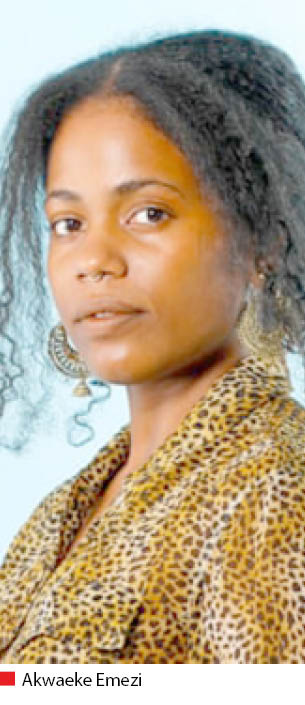How do you survive when they place a god inside your body?” This surprising question animates Akwaeke Emezi’s remarkable debut, pulsing through every phase of its heroine’s arduous but luminous journey with and towards her multitudinous selves. Conceived as an answer to her Catholic father’s prayers, Ada is a response from an Igbo deity – Ala – whose ways and worship her father has all but forgotten. Thus, this bildungsroman about a character whose essence is rooted in Igbo cosmology begins by inextricably linking her consciousness with cosmic forces that existed long before she was born.
Ada is the second child of Saul, a Nigerian doctor, and his Malaysian wife Saachi, a nurse. When Ada is still a child, Saachi leaves to work abroad, first in Saudi Arabia and then in the UK. Although she visits her family in Nigeria once or twice each year, she will never again live in the home she once made with her proud and impatient husband. At 16, Ada also leaves Nigeria, for the United States, where she spends her turbulent college years in Virginia. All the while, there is a claim on her head , “for being born incorrectly, for not returning, for crossing the ocean sifted with death”. While the effects of this claim might read like a curse, they are really a manifestation of a demand that she follow a predestined path. Ada is an ogbanje, a spirit child who is born repeatedly to the same parents, taunting and torturing them with many reincarnations. While most ogbanjes die as children, Ada survives into adulthood, constantly struggling against a pull towards self-annihilation.
In Virginia, Ada meets Malena, a Dominican girl who recognises her internal struggles without dismissing her experience as a psychosocial identity crisis. This external validation gives her selves some relief, because for them the “worst part of embodiment is being unseen”. While Ada’s life in the US is filled with both significant and fleeting relationships, including a short-lived marriage, the most intense and consequential is the one she has with her many selves. It is in the phantasmagoric dramatisation of this dynamic that Emezi’s surreal prose shines.
The novel begins with the first-person collective voice; “We” introduce Ada and map her trajectory from childhood in Nigeria through to her time in college. This We is the voice of all the personages that make up Ada. In the sections of Freshwater narrated with this technique, the voice is poetic, often incantatory. Its tone is mythic and remains assured even as Ada’s family becomes fractured by incremental measures during her childhood. There’s a definite change when Asughara, one of Ada’s selves, takes over the narrative, and with it a shift of viewpoint in Ada’s life. Asughara’s voice is colloquial and intimate, delightfully and distinctively Nigerian.
Although she has been a part of Ada all along, Asughara comes to the fore after a traumatic event and declares on arrival, “I already knew Ada was mine: mine to move and take and save.” Revelling in her possession of a human body, Asughara’s hunger for sensuous experience is a brutal force unmediated by human concerns about emotional consequences. She races through sexual encounters with hedonistic fervour, wreaking havoc on Ada’s relationships.
Eventually, a frustrated Ada decides it is time for Asughara to leave. By this time, Ada is aware that there is also a delicately masculine self in “the marble room of her mind”, and has named this gentler self Saint Vincent. In one of the most fascinating chapters, Ada confronts Asughara, intent on getting rid of her. Feeling betrayed, Asughara interprets this as attempted murder. Saint Vincent intervenes, telling Ada: “Asughara loves you.” It’s a testament to Emezi’s skill that this simple declaration rings true. Although enraged by Ada’s betrayal, when Asughara then pulls Ada towards suicide after years of self-harm, it is clear that this isn’t a vengeful move, but an attempt to save Ada and somehow alleviate her psychic pain.
When Ada finds a measure of peace, it is not a consequence of eliminating any of her selves: instead, it emanates from accepting that she is “a village full of faces and a compound full of bones, translucent thousands”. When we return to Nigeria, the narrator is Ada: not the tortured Ada who made her way tentatively into earlier chapters in the form of poems and diary entries, but a voice infused with We’s poetic cadence and Asughara’s blistering yet intimate tone. It is a fitting culmination for the extraordinary journey Freshwater charts, a manifestation of Ada’s realisation that she is irrevocably an amalgamation of all her varied and even divergent selves.
Source: The Guardian UK

 Join Daily Trust WhatsApp Community For Quick Access To News and Happenings Around You.
Join Daily Trust WhatsApp Community For Quick Access To News and Happenings Around You.


